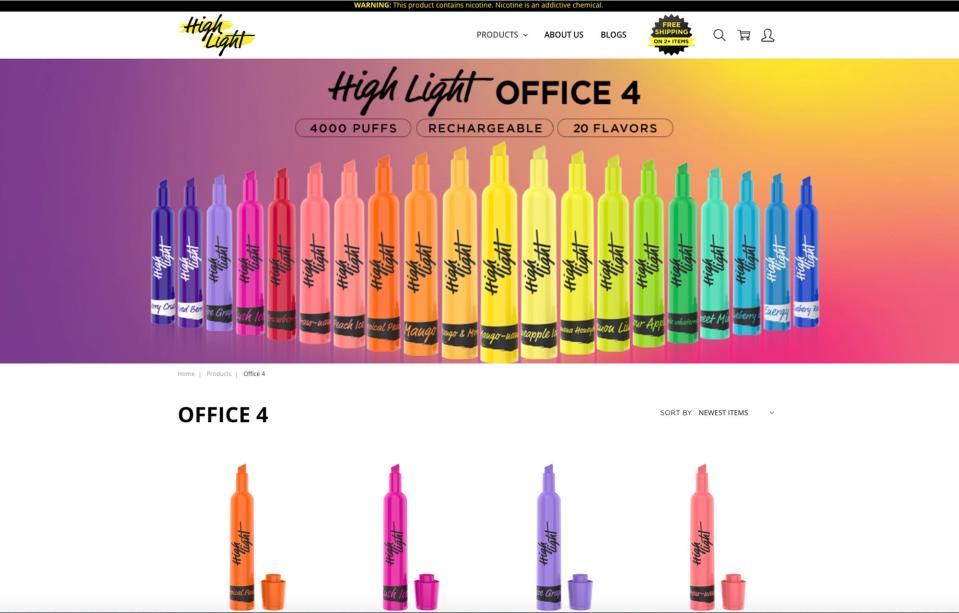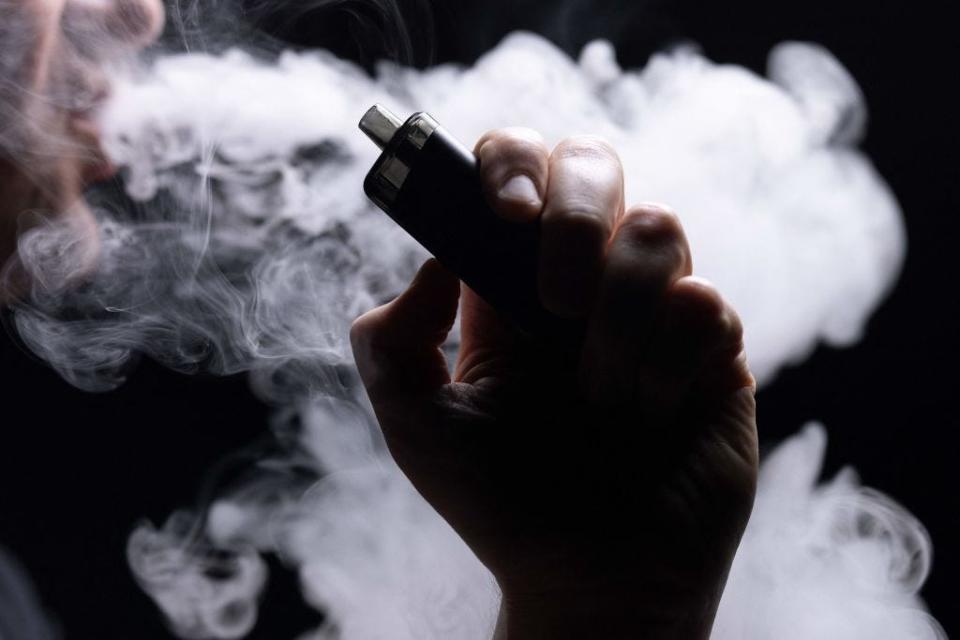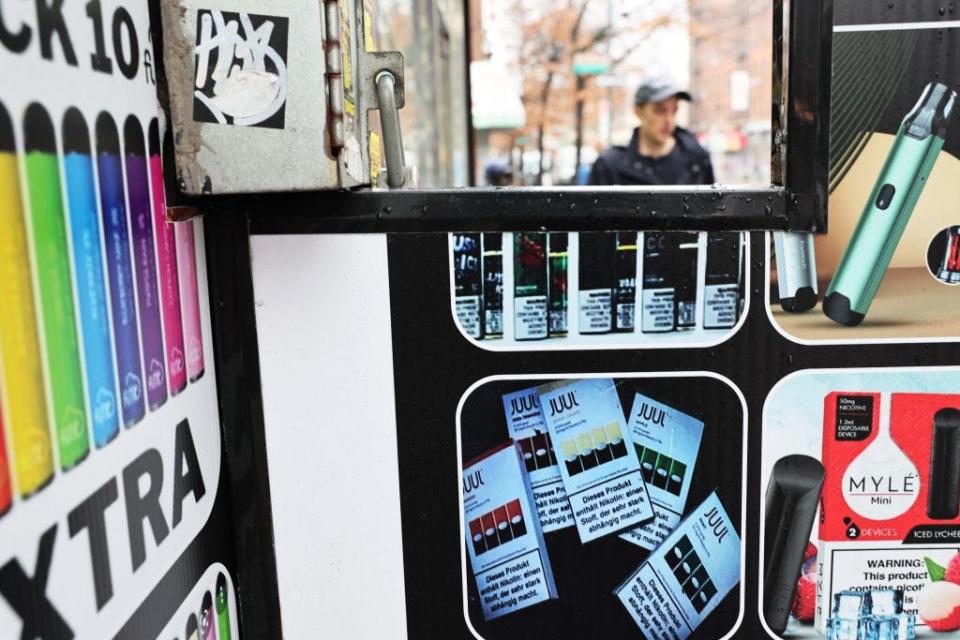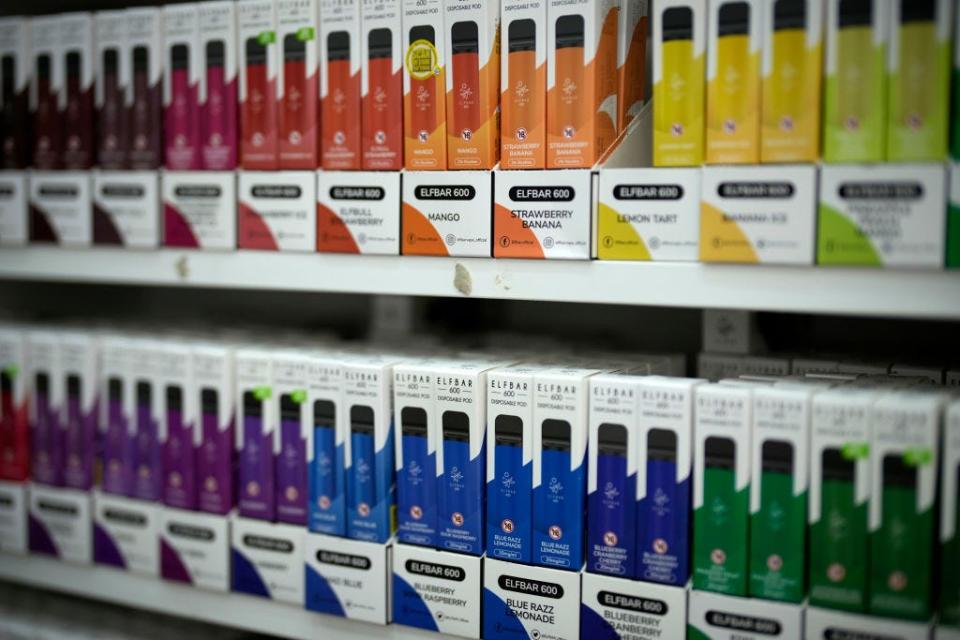These vape pens look like school supplies — and they’re being used in plain sight
An e-cigarette that looks exactly like a highlighter is being sold to U.S. retailers, allowing children to smuggle the camouflaged product into schools.
The High Light Office 4 e-cigarette is practically indistinguishable from a highlighter. Its angled, colorful tip makes it look ready for study hall even when uncapped. It provides 4,000 puffs, according to the company’s website, and is available in 20 flavors, from sweet mint to mango.
Teenagers have a specialty for staying one step ahead of the rules, and school resource officers are calling attention to the gargantuan challenge of keeping products like these out of lockers and classrooms.
"Nothing's really being enforced to stop the flow of these coming into our schools," said veteran Illinois school resource officer Stefan Bjes. "And we're seeing the numbers grow and grow and grow every single year."

It’s never been easier to vape in secret
Vapes are now manufactured to look like USB drives, ballpoint pens, smartphone cases and smartwatches. There are vaping backpacks and even vaping hoodies that hide tubing and a mouthpiece so the wearer can inhale inconspicuously.
"Some of these companies have gotten so creative in terms of how they disguise this, that's not doing us any favors," said Mo Canady, executive director of the National Association of School Resource Officers. "It's very difficult to detect."
School resource officers around the country are trying to figure out how to respond. Canady said that at their national conference last month, a breakout session dedicated to vaping ran out of space and was by far the heaviest attended.
"This certainly is a hot topic for a lot of SROs, where they're trying to help out and educating students and their parents about the dangers here," said Canady.
Changing the role of school resource officers
Bjes says the "exorbitant" amount of time and attention school resources officers now expend identifying and confiscating illegal vaping devices detracts from their ability to do other aspects of their jobs.
School resource officers and administrators should really be focusing on building relationships, dealing with threats of violence and addressing bullying, Bjes says. By putting them on the vape beat, they spend so much time in their roles as enforcers that they don't have time to wear their other hats: those of teachers and mentors. "You're pulling away from the essence of what the school resource officer is meant to be," he said.
Bjes says a student who is pushed into the juvenile justice system is significantly more likely to reoffend. In Detroit public schools, vaping is a code of conduct violation and a reportable offense that requires the school district to report the incident to the public safety department, complete an incident report and, depending on previous referrals, issue a range of disciplinary actions.
Not only that, but students who interact with law enforcement may be even more likely to use controlled substances in the future.
Highly addictive, and not always obvious
Disguising vape products as household items or personal belongings “allows teenagers to vape in secret and hide their nicotine use from their parents, teachers and classmates,” according to the Addiction Prevention Coalition.
Upticks in e-cigarette use mean that about 20% of high schoolers report using the products, almost half of whom use them frequently.

Vapes almost universally contain nicotine — even those whose packaging doesn't disclose it. The Centers for Disease Control and Prevention reports that some vape liquids marketed as containing 0% nicotine have been found to contain the highly addictive substance.
Even the term "vapes" is a marketing ploy, according to Chelsea Wuth, a Michigan Department of Health and Human Services spokesperson. It was "created by the tobacco industry to make these products appear less harmful, when in reality most vape products contain a large amount of nicotine, as well as several chemicals," she said.
Wuth said using these products can permanently damage developing adolescent brains. Nicotine has been shown to change the way teen brains function, increase the risk of future addiction to other drugs, and adversely affecting the lungs, heart, kidneys and reproductive system. Vaping nicotine products has also been linked to increased feelings of depression, anxiety and stress among young people.
Those sweet, minty and tropical flavors make the job even quicker. “The evidence is overwhelming that flavors play a key role in youth starting and continuing to use tobacco products, leading to addiction,” according to the youth-focused Take Down Tobacco.
Flavored vape products are flooding the market, and driving demand
The Food and Drug Administration made it harder to market flavored tobacco in the first days of 2020, and products had to submit to special approval if they contained any flavorings besides menthol. But enforcement proved weak, and manufacturers who can't produce here simply import disposable flavored products from China.

E-cigarette sales increased by nearly 50% from 2020 to the end of 2022, according to a CDC study published in June. The massive growth in sales was driven by kid-friendly flavors.
The greater availability has been matched with greater potency and addiction potential, but lower costs. From 2017 to 2022, disposable e-cigarettes sold in the U.S. nearly tripled in nicotine strength, quintupled in e-liquid capacity, and dropped in price by nearly 70%, according to a Truth Initiative study published this month.
In less than three years, the number of types of e-cigarette devices sold in the U.S. has nearly tripled to over 9,000, according to sales data obtained by the Associated Press, which reported that the retail market for e-cigarettes hit $7 billion last year.
While the FDA has taken specific aim at brands like Elf Bar and Esco Bar, the primary concern in Michigan is Breeze, according to Richard Marianos, former assistant director of the U.S. Bureau of Alcohol, Tobacco, Firearms and Explosives.

"Being Michigan-owned and operated, Breeze's influence here is akin to Nike's dominance in sportswear," Marianos wrote in a statement to the Detroit Free Press, part of the USA TODAY Network. "From my experience and discussions with local law enforcement, Breeze is indisputably the most significant challenge we're grappling with in this context."
'It's just absolutely reprehensible behavior'
The company that makes the Office 4 vape pen says on its website that its products are intended to provide “discreet” and convenient vaping for people on the go. A disclaimer on the website states that products containing nicotine are not for sale to minors.
High Light Vape told the Free Press its product was strategically named the "Office" in a bid to appeal to young professionals. “This specific nomenclature derives from its positioning as a discreet solution, catering to individuals who wish to avoid any potential scrutiny from their peers, superiors, and associates with regard to vaping within professional environments,” an unnamed spokesperson wrote in an email.

“Emblazoned on our packaging is the prominent age restriction of 21 and older, a testament to our unwavering commitment to refraining from sales to minors,” the statement read.
Bjes says the products are clearly marketed to kids. And Michigan advocates agree.
"It is completely irresponsible, and it is just another attempt by the tobacco industry to lure our kids into a lifelong addiction to nicotine," said Minou Jones, founder and CEO of Making It Count Community Development Corp. and chairperson of the Detroit Wayne-Oakland Tobacco-Free Kids Coalition. "When you are making products that resemble school supplies, that is just not playing fair."
Michigan doctors aren’t buying the company line, either.
“They're targeting our children to addict their next generation of customers,” said Dr. Russell Faust, medical director for Oakland County’s Health Division. “And it's just absolutely reprehensible behavior.”
For subscribers: A healthy 17-year-old had a stroke. Doctors think vaping was the cause.
Jones says Michigan lawmakers should ban the sale of flavored tobacco products now. "Manufacturers are looking for the loopholes to slip through the cracks," she said. "In Michigan, we need to not wait on the federal government to protect our kids."
Gov. Gretchen Whitmer in 2019 tried to ban flavored vapes with an emergency order that was struck down by the courts. In 2021, the Michigan Department of Health and Human Services abandoned an effort to institute a rule to that effect.
For subscribers: Want to make sure your child's school is safe? These are the questions parents should ask
Students looking for more information on quitting e-cigarettes can go to mylifemyquit.org, and additional resources are available here.
Jennifer Brookland covers child welfare for the Detroit Free Press in partnership with Report for America. Reach her at jbrookland@freepress.com.
This article originally appeared on Detroit Free Press: Vape pens that look like highlighters are being smuggled into schools

